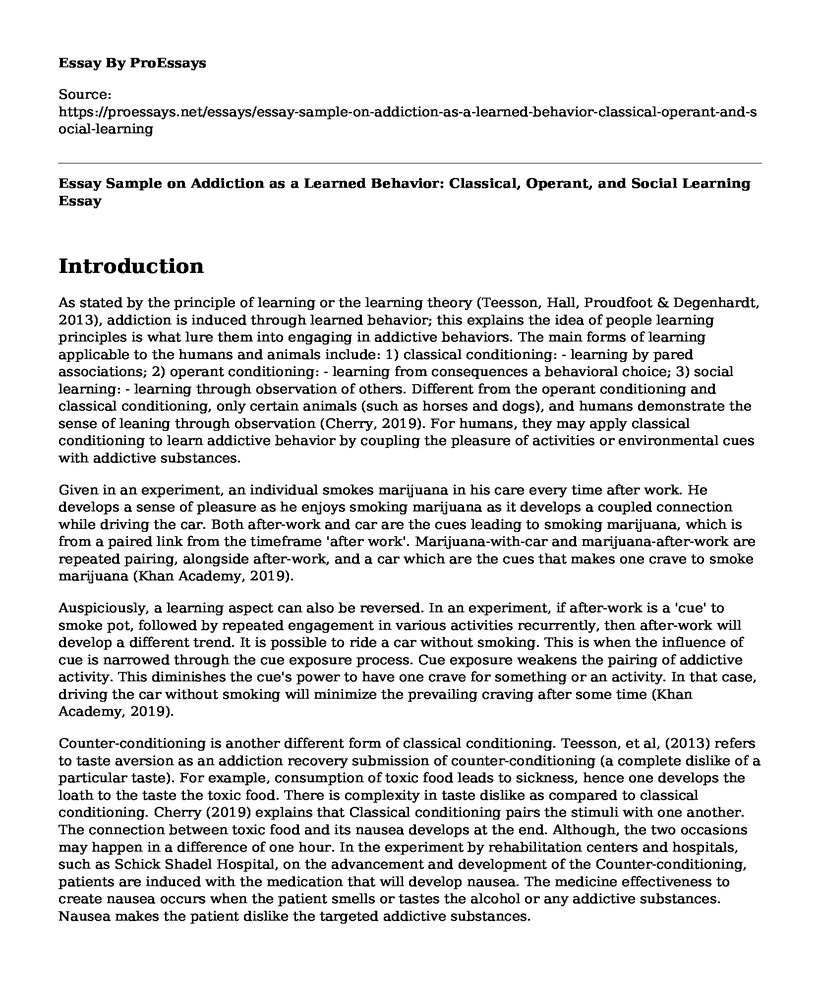Introduction
As stated by the principle of learning or the learning theory (Teesson, Hall, Proudfoot & Degenhardt, 2013), addiction is induced through learned behavior; this explains the idea of people learning principles is what lure them into engaging in addictive behaviors. The main forms of learning applicable to the humans and animals include: 1) classical conditioning: - learning by pared associations; 2) operant conditioning: - learning from consequences a behavioral choice; 3) social learning: - learning through observation of others. Different from the operant conditioning and classical conditioning, only certain animals (such as horses and dogs), and humans demonstrate the sense of leaning through observation (Cherry, 2019). For humans, they may apply classical conditioning to learn addictive behavior by coupling the pleasure of activities or environmental cues with addictive substances.
Given in an experiment, an individual smokes marijuana in his care every time after work. He develops a sense of pleasure as he enjoys smoking marijuana as it develops a coupled connection while driving the car. Both after-work and car are the cues leading to smoking marijuana, which is from a paired link from the timeframe 'after work'. Marijuana-with-car and marijuana-after-work are repeated pairing, alongside after-work, and a car which are the cues that makes one crave to smoke marijuana (Khan Academy, 2019).
Auspiciously, a learning aspect can also be reversed. In an experiment, if after-work is a 'cue' to smoke pot, followed by repeated engagement in various activities recurrently, then after-work will develop a different trend. It is possible to ride a car without smoking. This is when the influence of cue is narrowed through the cue exposure process. Cue exposure weakens the pairing of addictive activity. This diminishes the cue's power to have one crave for something or an activity. In that case, driving the car without smoking will minimize the prevailing craving after some time (Khan Academy, 2019).
Counter-conditioning is another different form of classical conditioning. Teesson, et al, (2013) refers to taste aversion as an addiction recovery submission of counter-conditioning (a complete dislike of a particular taste). For example, consumption of toxic food leads to sickness, hence one develops the loath to the taste the toxic food. There is complexity in taste dislike as compared to classical conditioning. Cherry (2019) explains that Classical conditioning pairs the stimuli with one another. The connection between toxic food and its nausea develops at the end. Although, the two occasions may happen in a difference of one hour. In the experiment by rehabilitation centers and hospitals, such as Schick Shadel Hospital, on the advancement and development of the Counter-conditioning, patients are induced with the medication that will develop nausea. The medicine effectiveness to create nausea occurs when the patient smells or tastes the alcohol or any addictive substances. Nausea makes the patient dislike the targeted addictive substances.
Teesson, et al, (2013 gives another type of learning known as the Operant conditioning; it is a learning system based on reward and punishment. According to the principle, if the first experience of the drug was a rewarding one, so we tend to return to it. Similarly, without unpleasant consequences of addiction, one will have no reason to abstain. People's recovery efforts can be naturally enhanced by letting consequences to occur. Given in the experiment where the loved ones can protect an individual from the negative consequences of their addiction. Without the loved ones' efforts, the addicted individual may become homeless or loss job.
References
Cherry, K. (2019). What's Difference Between the Classical and Operant Conditioning?. Retrieved 27 September 2019, from https://www.verywellmind.com/classical-vs-operant-conditioning-2794861
Khan Academy. (2019). Classical and operant conditioning article. Retrieved 27 September 2019, from https://www.khanacademy.org/test-prep/mcat/behavior/learning-slug/a/classical-and-operant-conditioning-article
Teesson, M., Hall, W., Proudfoot, H., & Degenhardt, L. (2013). Addictions. doi: 10.4324/9780203119334
Cite this page
Essay Sample on Addiction as a Learned Behavior: Classical, Operant, and Social Learning. (2023, Feb 17). Retrieved from https://proessays.net/essays/essay-sample-on-addiction-as-a-learned-behavior-classical-operant-and-social-learning
If you are the original author of this essay and no longer wish to have it published on the ProEssays website, please click below to request its removal:
- Issues for Women Regarding Romantic, Sexual Relationships and Marriage During the 1950s
- The Islamic State - Paper Example
- Essay Example on Women's Health: Ensuring Non-Discriminatory Care & Accessibility
- Essay Example on Alcohol Use: Contention Over Common Good in Catholic Context
- Essay Example on Gender Inequality in the Workplace: The Unfortunate Reality
- Gang Affiliation & Delinquency: A Linked Reality - Essay Sample
- Paper Example on Analysing Literary Devices in Ann Petry's Bones of Louella Brown







